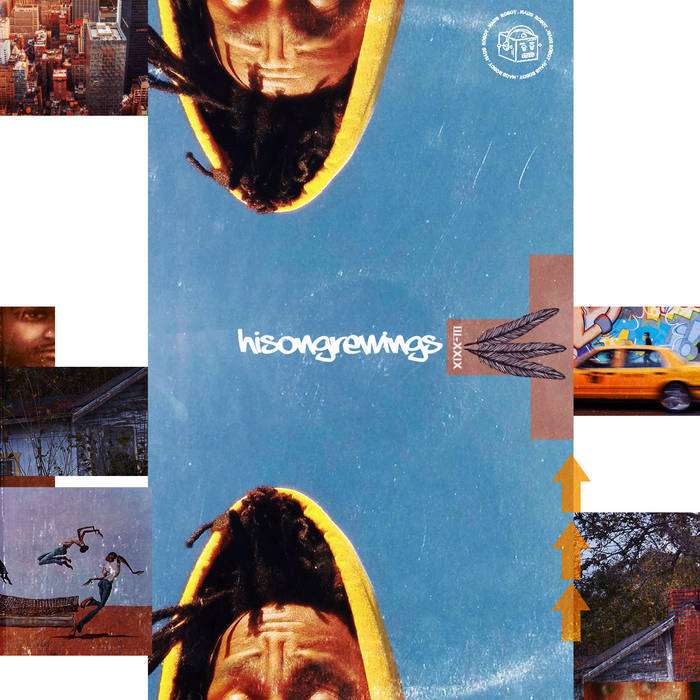See'J Foster - HiSonGreWings
Written by Chi Chi Thalken on April 8, 2020These days, Mobile artist See’J Foster might be best known for being one third of the dynamic group known as Basshead Jazz alongside Ottie James and Sidney Vadale. However, just a few years back he was trying to make it on his own as a solo artist, even moving to New York to shoot his shot. Life has a way of throwing curveballs at you, though, and after coming to the realization that he might be better served moving back home and building in Mobile, forming the aforementioned group and throwing shows, he might have thought he had a feeling for what was on the horizon. However, on March 30, 2019, one day after his father turned 73 years old, his father unexpectedly had a stroke and passed away. Over the next year, Foster has been taking time to process his father’s passing, what their relationship meant, and what his own path has meant in relation to his father’s journey. All of this has been channeled into his new solo album, HiSonGreWings.
There are a lot of layers to HiSonGreWings, but perhaps the base layer is the dissection of the specificity of what it means to be a Black father, especially of the older generation. Over the course of the album, Foster discusses at length the push and pull of their relationship, how his father both supported him, but also felt the need to toughen him up and prepare him to go out into a world that wasn’t going to always see him for who he really was or value him completely. To this part of the album, I’m sure a lot of listeners that share Foster’s background will knowingly nod their heads and reflect on the complexity of their own relationship with their father for similar reasons. Hopefully, if you come from a more privileged (white) background like I do, you will take a moment to let Foster’s words sink in and think about the systemic racism in this country that informs this feeling of obligation. That’s not all there is to the album, though. This album is also about the journey that Foster has been on while exploring that relationship with his father, from him deciding to be a musician, leaving Mobile for New York, betting on himself, and then coming back to build in Mobile. It’s about a journey of discovering place and purpose, about coming home again, and about learning to find your voice and trust in your vision.
The way this plays out on the album is incredibly interesting. If you’ve listened to other Foster projects, including Basshead Jazz, you might be anticipating some big singles that will bump until the roof comes off. That’s not what this project calls for, though. Instead, we get an album that really needs to be listened to in one sitting from front to back. Maybe light a candle, open up a window, put on some headphones, or anything else you might need to do to help you focus and absorb this artistic statement. Everything is very carefully sequenced to tell the story of Foster’s journey over the past five years, and to explore all of the relationships over that time period, whether it be his dad, his mom, his friends, or anyone else who helped guide him along this path. There are a fair number of skits, but not necessarily in the way you might anticipate if you’re thinking of how skits are typically used as comic relief on hip hop albums. Instead, think of them as spoken word pieces, or the connecting scenes in a musical. They fill in the gaps between songs, giving you crucial information about Foster’s experiences, from his father’s untimely death, to hearing from his roommate in New York that helped him through that leg of his journey. The songs themselves are all on the intimate and conversational side of things, with the production very much informed by The Dungeon Family, but just their mellower side, finding that sweet spot between trap and a more melodic and psychedelic R&B. There are a few moments where things start to bump a little, such as on “Homecoming King,” in which Foster gets to brag a little about the work he’s done in building up the scene in Mobile since his return, but it’s still kept in perspective as to how this fits alongside songs that are much more somber in tone. Foster is also a very thoughtful lyricist, and he’s very open with the ups and downs of his journey of the last five years, both the joy and the pain. On the mic, he’s very conversational and melodic with his delivery, in a way that really draws you in and lets you understand how all of these experiences have shaped him. Putting it all together, you get this beautiful artistic statement that simultaneously feels like you’re catching up with an old friend.
See’J Foster has given us a very special album in HiSonGreWings. It’s musically adventurous while remaining understated, lyrically challenging in its brazen honesty and raw emotion. It’s hearfelt, heartbreaking, and moving on a foundational level. It’s more than just an album about grieving his late father, but it’s also a loving tribute to the man that raised him. This is one of the best albums of 2020.
| Title: | See'J Foster - HiSonGreWings |
|---|---|
| Label: | S/R |
| Year: | 2020 |
| Rating: | 9/10 |

